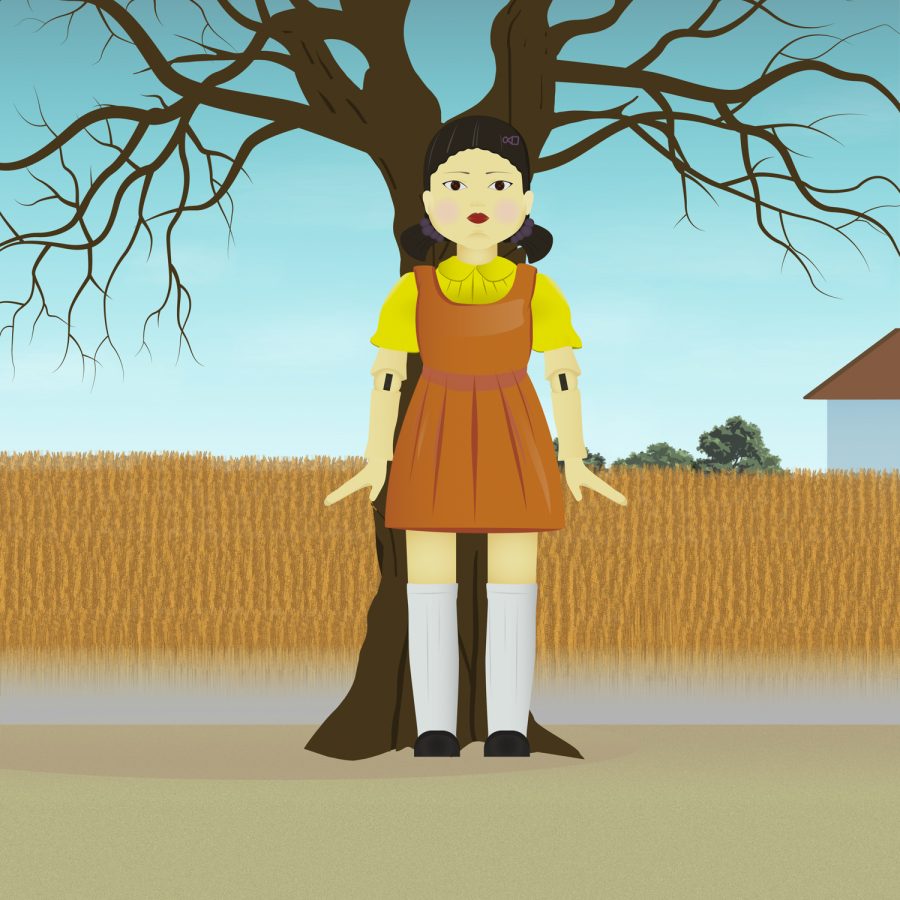Risking your life for stability
Players compete at extreme cost; metaphor for capitalism, social ranks
The morals of our world are examined through circumstances no one would dream to be in.
November 4, 2021
Warning: Spoilers ahead.
Unless you’re a film major or cinephile, most American audiences aren’t consuming international media. With the exception of Bong Joon-Ho’s “Parasite,” most Americans aren’t familiar with Korean entertainment.
Luckily for us, “Squid Game” by director Hwang Dong-hyuk exposes American audiences to the familiar plights of poverty and the struggles of morality. It reached the number one spot on Netflix in 94 countries and was translated into over 30 languages, according to Good Morning America.
“Squid Game” tells the story of Seong Gi-hun — played by Lee Jung-jae — an impoverished man living in debt with his elderly mother.
He meets a salesman who challenges him to a game of ddakji, a children’s game, for a chance to win money. The catch is, whenever he loses, he is slapped viciously by this salesman. After receiving a business card and the promise of more money, Gi-hun calls the number.
A car picks him up and he falls unconscious. He awakes in a dormitory-like setting with hundreds of other players. The rules in this mysterious place are simple: Follow the rules of the game or be eliminated. The players start their first game; Red Light, Green Light.
These deeply indebted participants soon realize that losing a game means not only the loss of the cash prize but a loss of their lives as well. He allies himself with other seemingly underdog players. This includes his childhood friend, Cho Sang-woo, and an elderly man whom Gi-hun quickly befriends.
This proves beneficial to him later on, helping him with the physical and psychological challenges of the games. However, it becomes clear that Gi-hun, always the idealist and the seemingly moral backbone of the show, is at odds with the reality the games present.
These games may offer the promise of wealth — 45.6 billion Won’s worth to be exact — but as we all know, nothing in this world is free. This game requires loss. Loss of human life, morality and the person you may think you are when entering the game.
We put judgment on a person put in a position we could never even dream of being in. The idea of otherwise good people turning more and more coldhearted as their morality is put to the test is scrutinized in our world constantly.
Everyone would love to say that they would be the good samaritan. We want to believe that our present morals would hold up if we were put in different circumstances.
When looking at what the main cast of characters represent, they are a clear parallel to the working class and underprivileged people of the real world. For example, Sang-woo is the elite, while Gi-hun represents the blue-collar working class. Ali is the — potentially illegal — migrant worker, and Sae-byeok seeks asylum in a country that looks down on where she’s from, according to director and creator of “Squid Game” Hwang Dong-hyuk.
And he’s absolutely right. All these characters represent people and the struggles many of the world’s minorities can relate to. Refugees seeking asylum and migrant workers coming to the U.S. illegally are hot topics that are talked about ad nauseam during election years.
However, Oh Il-nam, an older man who represents the senior class has an advantage all throughout the games. It’s revealed at the end that he is a VIP and founder of the game. This could mean that seniors, those who are part of the Baby Boomer generation, can still have more benefits than younger generations despite struggling physically and sometimes mentally as they age.
Housing inequality and the struggles of young, working-class Americans are greater than of the 60s and 70s when the Boomer generation were buying their first homes, according to a 2017 study.
As is common with anticapitalist stories, the plot focuses on the main characters teaming up together, and working towards a common adversary through acts of unity. For example, during the tug of war game, Gi-hun’s team wins through all players of his team working towards a common purpose.
“Squid Game” asks a simple question. What would you do in order to gain financial stability? How many hours a week, what kind of labor, how little benefits, what type of abuse are you willing to go through in order to be happy?
The host of the game even tries to draw comparisons between the ultra-wealthy VIPs and the poor players in the game saying that they’re both miserable, even though this type of thinking completely ignores the physical and mental burden of not having enough to survive.
“Squid Game” is a thrilling show with stories of people simply trying to make it in their world. As a critique of capitalism, it demonstrates that the good and evil within us can’t be separated, and unless the working class can come together in solidarity for a common goal, the VIPs of the world will continue to benefit from poverty.
“Squid Game” can be found on Netflix at the number three spot on trending.









